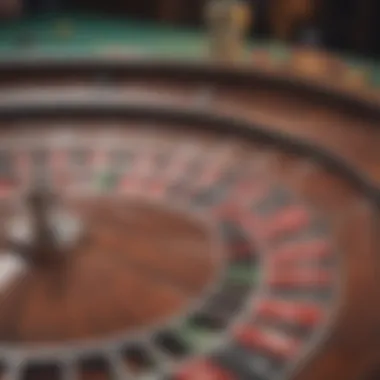Mastering Roulette Odds and Payouts for Success


Intro
Roulette is a game that seems quite simple on the surface, but there’s a whole world of numbers and probabilities lurking beneath. As you sit at the roulette table, the spinning wheel and the bouncing ball may create an air of excitement, but understanding the odds and payouts is crucial for making well-informed bets. This article will explore the intricate web of betting options, the strategies players employ, and the mathematical foundations that govern this classic casino game. Whether you’re a newcomer trying to find your footing or a seasoned player looking to refine your approach, the insights provided here aim to enhance your understanding and boost your betting expertise.
Betting Strategies
When approaching roulette, having a solid betting strategy can often make the difference between a fateful trip to the cash machine or a leisurely evening at the tables. Players have developed various techniques over the years, each with its unique set of principles and approaches.
Common Betting Systems
Many players gravitate toward established betting systems to guide their gameplay. Here are a few common strategies:
- Martingale: This progression system advises doubling your bet after every loss. While it’s designed to recover past losses, it does put your bankroll at risk if you hit a long losing streak.
- Fibonacci: Based on the famous sequence, this system involves betting by adding the last two bets together. It’s less aggressive than the Martingale approach, which may allow for longer playtime.
- D'Alembert: This method suggests increasing your bet by one unit after a loss and decreasing it by one after a win. It's considered a more balanced risk approach.
Each system has its pros and cons, but no strategy can alter the game's inherent house edge. Players must manage their expectations and their bankrolls effectively.
Advanced Betting Techniques
For those looking to up the ante, there are advanced techniques worthy of consideration. These strategies may require a deeper understanding of the game, but they can be rewarding when applied correctly:
- Sector Betting: This involves placing bets on specific sections of the wheel rather than numbers alone. Players often prefer this to cover a broader range of potential outcomes.
- The Visual Ballistics: A more complex technique, it requires observing the dealer's style and the wheel’s characteristics over time to predict where the ball might land. This is more of an art than a science and requires acute observation skills.
The key to success in roulette lies not just in the system used, but in understanding the odds and payouts that are inherently a part of the game.
As you can see, many dynamics are at play when navigating roulette’s odds and payouts. It’s not enough to simply place chips on a number; understanding how each bet interacts with the odds can foster a significant advantage.
By familiarizing yourself with these strategies and techniques, you can elevate your game and make more informed betting choices, paving the way for a more enjoyable and potentially lucrative roulette experience.
Preface to Roulette
Roulette stands as one of the cornerstone games of casinos, a mesmerizing blend of chance and strategy that has captivated players for centuries. Understanding the dynamics of roulette is crucial whether you're stepping into a lavish Vegas casino or playing online from the comfort of your living room. This section will lay out the significance of grasping the essentials of roulette, instilling both respect and insight into this thrilling game.
The importance of this introductory knowledge is twofold: one, it informs potential players about what to expect, and two, it unravels the complexities of the game that can be exploited for a better chance at success.
Historical Context of the Game
Roulette's origins date back to 18th century France, where it made its debut as a novel gambling option among the aristocrats. The name "roulette" translates to "little wheel" in French, which aptly describes the central mechanism of the game. Over the years, roulette has undergone various transformations, adapting to the tastes and preferences of players across different cultures. The classic version we know today stemmed from a mix of Italian board games, French innovations, and the eventual incorporation into American gambling halls.
By the late 19th century, roulette had reached the shores of America, introducing the double zero to appeal to local gamblers. This addition skewed the odds slightly in favor of the house, a trend that persists in American roulette today. Over time, the game has solidified its reputation not just as a game of luck but as a significant cultural icon, often portrayed in films and literature.
Basic Rules and Objective
At its core, the objective of roulette is refreshingly straightforward. Players place bets on where they believe the ball will land after the wheel is spun. What's enchanting about roulette is the vast array of betting options available, allowing players to tailor their strategies based on risk tolerance and personal preference.
Generally, bets can be placed on:
- Single numbers or a range of numbers.
- Colors such as red or black.
- Even or odd numbers.
The game operates within a confined set of rules. Players place their bets within a designated period before the wheel is spun, and then the croupier (dealer) releases the ball. The anticipation builds as the ball bounces around the wheel, ultimately landing in a numbered pocket, determining the winning outcome.
Overall, a foundational understanding of roulette enhances the gaming experience, allowing for better decision-making and a deeper appreciation of each spin of the wheel.
Types of Roulette
Understanding the different types of roulette is crucial for both novice and seasoned players alike. Each variation has its unique elements that significantly impact gameplay and strategy. Knowing the key differences helps players make more informed decisions, which can greatly affect their odds and overall experience at the table. By having a firm grasp on these distinctions, gamblers can not only enhance their enjoyment of the game but also potentially increase their winnings.
European Roulette
European roulette is perhaps the most popular variation worldwide. It features a single zero on the wheel, which gives the house a smaller edge compared to its American counterpart. This slight difference can have a significant impact on players’ chances.
It's played on a wheel with numbers ranging from 0 to 36, and bets can be placed on individual numbers or groups of numbers. A key attraction is its relatively lower house edge of 2.7%, making it a preferred choice for many gamblers.
Advantages of European Roulette
- Lower House Edge: The single zero means there's a greater chance for players to win, especially for those placing outside bets like red or black.
- Familiarity: This version is widely played in most European casinos, making it easier to find and play.
American Roulette
American roulette, on the other hand, adds an extra layer of complexity. In addition to the numbers 1 through 36, it features an additional double zero (00). This seemingly minor change causes the house edge to jump to about 5.26%.
This variant might be appealing with its larger payouts for certain bets, but it's important to remember that the odds are not in your favor.
Key Characteristics of American Roulette
- Double Zero Feature: The double zero increases the house edge, making it a less favorable option for strategic players.
- Variety of Bets: Offers a wide array of betting options, which can attract players looking to spice things up a bit.
French Roulette


French roulette may not be as widely known but is certainly worth mentioning due to its distinct characteristics. It incorporates both the single zero like European roulette and unique betting options. The table layout and the rules, especially for the “La Partage” rule, provide an interesting twist that players may find advantageous.
In French roulette, if the ball lands on zero, players have the option to lose only half of their even-money bets, reducing their potential losses.
Unique Aspects of French Roulette
- La Partage Rule: This rule means players can recover half their bet when the ball lands on zero, which is an intriguing safety net.
- Table Layout: The layout is distinct, often offering additional bet types not found in other versions, appealing to players looking for different strategies.
Each version of roulette brings its flavor to the table, so to speak. Players should thoroughly understand these types to unleash their full potential when betting. The informed choices made at the roulette table begin with understanding these fundamentals.
"Knowing the different types of roulette is like knowing your cards; it sets the stage for your gameplay."
Understanding Roulette Odds
Understanding the odds in roulette is akin to peering behind the curtain of a grand performance. It allows players to grasp not just the numbers on the wheel but also the likelihood of winning your bets. Why is this important? Well, knowledge of odds gives you the upper hand. It provides clarity on what risks you're taking, while also revealing how much you could potentially gain.
For any gambler serious about roulette, getting a handle on the odds is paramount. The odds not only shape your betting strategies but also impact your overall experience at the table. With that being said, certain factors come into play:
- Bet Type: The variety of bets available in roulette means that not all bets hold the same odds. Framing your approach around different bet types can greatly influence your success.
- Risk Assessment: Knowing the odds allows you to assess how much of your bankroll you’re willing to risk on any single session.
- Game Variations: Different roulette versions offer unique odds and features. Understanding these variations can help refine your strategy.
In understanding roulette odds, one discusses two vital subsections—the mathematical basis of odds and the house edge. The blend of theory and practice creates a dynamic environment where informed players can thrive and engage meaningfully with the game.
The Mathematical Basis of Odds
The math behind roulette may seem daunting at first, yet it rests on a straightforward principle. At its core, odds indicate the likelihood of a particular outcome happening relative to all possible outcomes. In roulette, this translates to understanding how many winning versus losing positions exist for each bet type.
For instance, in European roulette, there are 37 pockets—the numbers 1 through 36 and a single zero. If you place a straight-up bet on any single number, your odds of winning stand at 1 in 37, or about 2.7%.
To put this into perspective, consider the payout structure:
- Winning on a straight bet (single number): Pays 35 to 1, meaning for every dollar bet, a win returns $35 plus the initial bet.
- Other bets, like red or black, carry different odds: Here, you have 18 winning choices out of 37, so your chance of winning rises to approximately 48.6%, with a payout of even money.
Calculating odds effectively involves a mix of basic arithmetic and an understanding of the underlying probabilities. Players who can carry the numbers in their heads can react quickly at the table, bolstering their edge in gameplay.
House Edge Explained
House edge—at first glance, it may appear to be just another term thrown around the dimly lit casinos. In reality, it represents a key concept every gambler ought to be aware of. The house edge reflects the percentage of each bet that the casino expects to keep over the long run.
For European roulette, this edge stands at about 2.7% due to the inclusion of just one zero. On the flip side, American roulette, with its additional double zero, has a house edge of 5.26%. This increase in house edge can dramatically affect a player’s chances of coming out ahead in the long term.
The takeaway here is straightforward but critical:
- Understand the Edge: Recognizing how the house edge impacts different bets can help manage expectations.
- Strategic Betting: Players may want to consider which version of roulette they engage with, as one offers a better chance at winning than the other.
"Knowledge is power, and in the game of roulette, understanding the odds can be your greatest ally."
From the math behind the probabilities to identifying the house's advantage, recognizing these elements equips you with the necessary insights to navigate the roulette wheel with a clearer mind. By leveraging this understanding, you not only enhance your gaming experience but elevate your strategic approach as well.
Payout Structures in Roulette
Understanding the payout structures in roulette is critical for anyone looking to master the game. It's not just about how much you can potentially win; it's also about the strategic choices that can be made based on these payouts. Payout structures influence betting tactics and help players gauge risk versus reward. Knowing what each bet pays out can enhance your overall gaming experience and improve your decision-making.
In roulette, each betting option comes with its own set of odds and corresponding payouts, shaping how players approach their stakes. Understanding these factors not only aids in bankroll management but also underscores the balance between risk and potential reward. Key elements include the types of bets available, the ratio of payout to likelihood, and the house edge associated with each option.
Types of Bets and Their Payouts
Inside Bets
Inside bets are made on specific numbers or a small group of numbers on the roulette table. This type of bet is celebrated for its high potential payouts. For instance, if you place a straight-up bet on a single number and win, the payout is typically 35 to 1. This substantial potential makes inside bets appealing for thrill-seekers. However, while the rewards are generous, they come with a lower probability of winning—betting on a single number means that a player may lose more frequently. Therefore, while the allure of high returns can be tempting, players must temper their enthusiasm with caution.
- Key Characteristics: Combines high risk with high reward.
- Unique Features: Offer payouts much greater than outside bets but also come with lower winning chances.
- Advantages/Disadvantages: Ideal for players hunting big wins; however, losses can accumulate quickly.
Outside Bets
In contrast, outside bets are made on larger sections of the number grid, such as bets on red or black, odd or even, or ranges of numbers like 1 to 18. This betting option is generally favored by players looking for a steadier stream of winnings. The payouts for these bets usually stand at even-money (1 to 1) for red or black bets, which means the chances of winning are significantly higher than those of inside bets. This balance attracts players who prefer a cautious approach, often allowing for a longer playtime at the table.
- Key Characteristics: Lower risk with more frequent payouts.
- Unique Features: Suitable for those aiming to grow their bankroll steadily.
- Advantages/Disadvantages: Although returns are lower, they provide a cushion against large losses, making them ideal for new players or those on a budget.
Call Bets
Call bets are a unique category in roulette, often used in French and European roulette. They offer players the opportunity to bet on a combination of numbers without needing to place physical chips on the layout. For example, the “Voisins du Zero” bet covers a specific segment of numbers around zero. This type of betting calls for a good understanding of the layout to maximize potential returns.
- Key Characteristics: Allows strategic grouping of numbers.
- Unique Features: Offers distinctive ways to engage with the table, appealing to those who enjoy tactical gameplay.
- Advantages/Disadvantages: More complex and can lead to higher potential winnings, but might overwhelm novice players.
Payout Ratios for Different Bets
In roulette, not all bets are created equal when it comes to payouts. For instance, inside bets like a single number may offer a whopping 35:1 payout ratio, while more conservative outside bets typically only provide even money—1:1. Understanding these ratios helps players structure their betting strategies effectively. For practical purposes, here’s a quick overview:


- Inside Bets: Straight-up (35:1), Split (17:1), Street (11:1)
- Outside Bets: Even/Money bets (1:1), Dozen (2:1), Column bets (2:1)
Getting to grips with these ratios adds depth to your roulette strategy, reinforcing the importance of intelligent betting practices within the game's framework. By comparing the various payout structures, players can make informed decisions that suit their risk preferences.
Roulette Odds Payout Chart
The roulette odds payout chart serves as a fundamental tool for anyone engaging with the game. It offers players a glimpse into the precise nature of payouts corresponding to various bets. Understanding this chart is not merely about numbers; it's about strategizing your play, predicting outcomes, and boosting your overall gaming experience. Here, we delve into the elements that make this chart vital in the realm of roulette betting.
Comprehensive Odds and Payout Overview
The chart lays out a clear framework for odds and payouts, showing how each type of bet interacts with the overall game dynamics. Here are several key elements to consider:
- Types of Bets: The chart delineates various betting options: inside bets, outside bets, and call bets. Each carries its own risk-reward ratio. Inside bets target specific numbers with higher potential payouts but lower odds of success, while outside bets cover broader ranges.
- Payout Ratios: By highlighting the payout ratios for different bets, the chart assists players in calculating potential returns before placing their chips. Knowing whether a straight bet pays 35 to 1 or a color bet pays 1 to 1 can influence betting decisions significantly.
- Visual Clarity: A well-structured chart is easy to digest at a glance. This is crucial in a fast-paced gaming environment where quick decisions might be the norm. It maximizes efficiency, reducing cognitive load when weighing multiple options.
In short, the payout chart serves as both a reference and a guide, equipping players with the tools to make informed decisions and to understand the associated risks.
Interpreting the Chart
Interpreting the odds payout chart requires not just a glance but some understanding of the underlying principles at play. Here’s how one might break it down:
- Understanding Betting Types: Begin by identifying the kind of bets you prefer. Inside bets might be appealing for their high payout potential, while outside bets can offer a steadier stream of smaller payouts.
- Calculating Potential Returns: It’s good to know precisely what you stand to win based on the bet made. If you place a bet and win, gauging your expected payouts based on the chart can clarify how to manage your bankroll effectively.
- Adapting Strategy: Players can tweak their strategies based on insights gained from the chart. For example, if data shows that outside bets have a higher frequency of returns for you personally, it could influence a shift in your chosen betting approach.
- For instance, placing a bet on specific numbers can yield a hefty return, but it also means a lower chance of winning. On the contrary, betting on red or black offers a better chance to win, but the payout is much smaller.
Remember: Evaluating the odds and understanding the payouts is about aligning your stake with your risk tolerance and gaming strategy. The chart allows for a more informed roulette experience, making it essential for both beginners and seasoned players alike.
By mastering the interpretation of the odds payout chart, players are not just better equipped to place informed bets but may also enjoy a more rewarding experience overall.
Strategies and Betting Systems
In the exciting world of roulette, having a solid strategy under your belt can be the difference between casual gameplay and serious engagement. Players often turn to various strategies and betting systems to maximize their enjoyment and potential returns. Understanding these systems is essential, as they provide a framework for decision-making and help players manage their bankroll effectively. The allure of the spinning wheel goes hand-in-hand with these strategies, creating a more structured and thrilling gambling experience.
Strategic betting not only enhances the game but also allows players to approach it with a calculated mindset. With careful consideration of odds and payouts, players can make informed bets that align with their risk tolerance and financial goals. However, it’s crucial to approach these systems with caution. Betting systems do not guarantee winnings; they function more as guidelines to improve overall gameplay.
Here we will dive into some of the most popular betting strategies, including the Martingale, D'Alembert, and Fibonacci systems, each boasting its own unique methodology and appeal to different types of players.
Martingale System
The Martingale system is often the first strategy that comes to mind for many new gamblers. This method relies on a straightforward yet bold principle: double your bet after a loss. The idea is grounded in the belief that, eventually, you will win. When you do win, the payout will cover all previous losses plus a profit equal to your original stake.
For example, if you start with a $10 bet and lose, your next bet would be $20. If you lose again, you would then wager $40. This doubling continues until you win. Once you hit a win, you revert back to your original bet.
While it sounds effective in theory, the Martingale system has its caveats:
- Bankroll Risk: You can quickly exhaust your bankroll if a losing streak persists.
- Table Limits: Casinos maintain betting limits that may prevent you from doubling indefinitely.
Using this system requires careful consideration of your funds and the house limits to avoid running into trouble. Nevertheless, many players have found it tempting and engaging.
'Alembert System
In contrast, the D'Alembert system presents a softer approach. This method involves increasing your bet by one unit after a loss and decreasing it by one unit after a win. The concept is aimed at bringing balance back to the betting game. You might start with a basic unit of, say, $10. After a loss, you would increase your next bet to $20, and after a win, reduce it back to $10.
This method suits players looking for a balanced approach, as it does not demand the high risk associated with the Martingale. However, it’s not without flaws:
- Slow Progression: Gains may be modest, making it less exciting for some players.
- Still Risky: Long losing streaks can still take a toll on your bankroll.
The D'Alembert system encourages a more conservative style, which might be preferable for players who want to mitigate their risks while still being active in their betting process.
Fibonacci Sequence Betting
The Fibonacci system takes a different turn by incorporating a mathematical sequence into betting. Here, each bet corresponds to a number in the Fibonacci sequence, where the next number in the sequence is the sum of the two preceding ones. For example, if you start with 1, the sequence goes like this: 1, 1, 2, 3, 5, 8, 13, 21, and so forth.
When you lose, you move to the next number in the sequence for your next bet. When you win, you step back two numbers. Thus, if you started with a $1 bet and lost several times, your bet would increase following the sequence. Once you hit a win, you reduce the bet based on the rules mentioned.
This method provides a structured yet flexible betting strategy and may appeal to those who enjoy a systematic approach:
- Pattern Recognition: Utilizing the natural flow of the Fibonacci sequence can be attractive to mathematicians or logical thinkers.
- Risk Management: This strategy can ease the sting of losses while allowing for gradual regaining of funds.
Nonetheless, players must be cautious, as it can still lead to substantial losses if luck isn’t on your side.
Each strategy has its pros and cons, and understanding them can greatly enhance your experience at the roulette table. Choosing the right method depends on individual preferences, risk tolerance, and overall objectives.
The Importance of Bankroll Management
Effective bankroll management is a cornerstone of successful gambling, especially in games like roulette where the odds and payout structures can vary significantly. Understanding how to manage your funds not only affects your immediate gameplay but can also establish a healthy approach to gambling beyond mere chance. When players neglect this vital aspect, they often find themselves in dire straits, quickly running out of money and missing out on future opportunities to play.
Setting Limits


One of the first steps in bankroll management involves setting clear limits on how much you are willing to spend. Establishing a budget should not feel like a shackle. It’s your safety net, and it allows you to enjoy the great atmosphere of the casino without the stress of financial pressure.
Consider a situation where a player heads to a casino with $500, ready for an exciting night. If this player doesn’t set a limit, that initial excitement could lead to losing the $500 in one sitting. But if they resolve ahead of time to spend only $100 on roulette, they can enjoy a more relaxed experience, placing bets within their means. This way, if they're lucky, they can extend their gameplay, perhaps turning $100 into $300, rather than leaving with empty pockets.
Adjusting Bet Sizes
Next, adjusting bet sizes is equally crucial. Many novice players make the mistake of betting too much on each spin, hoping to double their money in one go. This approach can lead directly to a quick loss and a frustrating gambling experience. Instead, bet sizing can fluctuate based on your current bankroll and perception of risk.
For instance, if you've set a limit of $150 for a session, starting with smaller bets—maybe $5 to $10—allows you to place a greater number of bets, increasing your chance of hitting a win over time. When your bankroll increases, you might opt to make slightly larger bets, or perhaps double down on a winning streak, but always keep an eye on your overall limits. Properly adjusting your bets to suit both your current funds and your desired pacing keeps gameplay enjoyable.
"A single bet can lead to a moment of thrill, but a well-managed bankroll can secure your betting adventure over the long haul."
By understanding and practicing these two fundamental components of bankroll management, players can significantly amplify their roulette experience, turning what can often be a fickle game of chance into a thrilling and sustainable pursuit.
Common Myths and Misconceptions
In the realm of roulette, various myths circulate that can easily confuse players, whether they're just stepping up to the table for the first time or they're seasoned gamblers. A stretched truth here, some misleading information there, and you've got a recipe for misinformed betting choices. Chasing losses and believing in hot and cold numbers are two examples that often lead players down the wrong path. Clearing the air regarding these misconceptions is essential. This section dives into common beliefs and sheds light on their validity, ultimately helping readers make better decisions when placing their bets.
Chasing Losses
The idea of chasing losses is one that can grab people’s attention, typically fueling their desire to recover what’s been lost. Picture this: you sit at the roulette, watch the wheel spin, and if Lady Luck doesn’t come your way, you think, "Next round, I need to bet bigger! I can’t leave now!" While the urge to recoup losses feels logical, it can result in a slippery slope.
When players chase their losses, they often increase their bets in an attempt to win back what they've just lost. This behavior can lead to bigger losses and desperation, making it more challenging to stick to a solid betting strategy. Sometimes, it’s as if the roulette table has transformed into an emotional battleground.
Some key points to consider include:
- Budget Constraints: Stick within your bankroll. Chasing losses might lure you into spending more than you intended.
- Game Odds Remain Unchanged: Each spin of the wheel is an independent event. Past spins do not affect future outcomes, contrary to what many believe.
- Emotional Decision-Making: When emotions run high, decisions can become erratic. Calmness and strategy should rule your gameplay.
Hot and Cold Numbers
Now let’s get into the realm of hot and cold numbers. Some players love to swear by the theory that certain numbers become ‘hot,’ meaning they come up often, while others become ‘cold,’ rarely seeing the light of day. This belief can drive a player to consistently bet on a hot number, hoping it will keep rolling like a streak of good fortune.
Here’s the kicker: roulette is a game of chance. Regardless of previous results, each number has an equal shot of coming up. Just like the flip of a coin or rolling dice, the outcomes are random. Believing in hot and cold streaks often diverts one's focus from the actual odds, giving a false sense of security.
Consider these aspects:
- Independent Events: Each spin of the wheel is separate. A number can’t magically become hot or cold based on previous spins or player bets.
- Confirmation Bias: Players may tend to remember successful bets while forgetting the many losses that didn’t go their way.
- Maximizing Fun Over Strategy: While it’s okay to place a bet on your favorite number, remember to prioritize informed strategies based on the odds.
In summary, relying on myths and misconceptions in roulette can be costly. Understanding the mechanics of the game and keeping emotions in check can lead to more enjoyable gaming experiences and ultimately better decision-making.
Technological Impact on Roulette
The evolution of roulette has been significantly shaped by technological advancements over the years. As innovative features continually emerge, they not only enhance the player experience but also influence the game’s dynamics. Examining the technological impact on roulette reveals how modern enhancements contribute to more engaging gameplay and potentially better betting outcomes.
Live Dealer Games
One of the biggest shifts in the online gambling landscape is the introduction of live dealer games. These games bring a slice of the casino atmosphere to players’ screens. With real dealers operating real roulette wheels via live video streams, players can engage with the game in real-time. The interactive element allows for a more authentic experience, as participants can chat with the dealer and other players.
Here are some key aspects of live dealer games in roulette:
- Reality Check: Many gamblers crave the tangible aspects of land-based casinos. Live dealer games provide that sense of reality, combating the sometimes sterile feeling of online play.
- Transparency: Players can observe the dealer and the wheel, which can help alleviate concerns about game integrity. For some, seeing a real spin adds a layer of trust.
- Variety of Tables: Online platforms often provide multiple tables with different betting limits, allowing players of all budgets to find their fit. This versatility can lead to a heightened betting experience.
"The essence of gambling is not just the potential for winning money; it’s about the thrill of the experience. Live dealer games encapsulate that excitement and make it available anytime, anywhere."
Random Number Generators
On the other hand, Random Number Generators (RNGs) play a crucial role in the online roulette world. These complex algorithms ensure that every spin is random and fair, mimicking the unpredictability of a physical roulette wheel. Understanding the functionality behind RNGs is essential for those engaging in virtual gambling environments.
Consider the following points about RNGs in roulette:
- Fairness and Integrity: RNG technology is essential in guaranteeing that results are unpredictable. It checks out for players who worry about backroom shenanigans since a well-implemented RNG delivers outcomes that are statistically fair.
- Game Variety: With RNGs facilitating numerous game variations, players can enjoy diverse options. Whether it's European, American, or specialty roulette games, each offers unique payouts and experiences.
- Accessibility: Unlike live dealer games that require a stable internet connection and a set schedule, RNG-based games can be played anytime. This breadth of access appeals to many players who prefer flexibility in their gaming sessions.
Culmination and Future Trends
In wrapping up a discussion about roulette, it’s vital to reflect on the significance of understanding odds and payouts. The landscape of gambling continues to transform, oscillating between tradition and technology. Players who grasp these aspects can make more calculated choices rather than allowing luck to dictate their fates.
One fundamental element in any gambling strategy is awareness. Comprehending the odds creates a baseline for players, allowing them to recognize their potential returns and set realistic expectations. When players know the payout structures, they can devise smarter bets that align with their risk appetite. Essentially, this transforms the experience from mere chance-taking into a form of strategic engagement.
Another consideration involves the impact of evolving technologies. As new games emerge, alongside innovative roulette variations and platforms, having a foundation in how odds and payouts function will help players adapt swiftly. Being ahead of the curve can contribute to a more enjoyable and potentially lucrative experience.
Moreover, the allure of roulette remains not just in its simplicity, but in its intricate layers—each bet tells a story, each spin a new chapter. The future is likely to bring additional variations and hybrid games mixing elements of both traditional and modern formats. Players who adapt to these changes will likely find themselves at a significant advantage.
"Knowledge is power; in roulette, it’s also your best bet."
Summary of Key Takeaways
- Understanding odds and payouts is crucial for any roulette player.
- A clear grasp of payout structures can guide more astute betting decisions.
- Technological advancements will continually reshape the roulette landscape, making adaptability key.
- Strategic engagement enhances the gambling experience, transforming it from a game of pure luck into one of informed choice.
Anticipated Developments in Roulette
The road ahead for roulette seems paved with exciting possibilities. Players can expect:
- Increased Incorporation of Technology: The merger of virtual reality and augmented reality into gameplay might revolutionize how players interact with roulette.
- Emergence of Hybrid Games: New formats that blend traditional roulette aspects with elements from other popular games could gain traction, attracting diverse audiences.
- Customized Player Experience: As data analytics becomes more prevalent, casinos may offer tailored betting options based on individual player behavior, creating a more personalized engagement.
- Regulation Changes: As online gambling legislation continues to evolve, the availability and types of roulette games may expand, presenting new opportunities and challenges.
In essence, as the game adapts and grows, so too must the players. Staying informed about these trends is not just beneficial—it’s essential for those wanting to thrive in this dynamic gambling realm.



